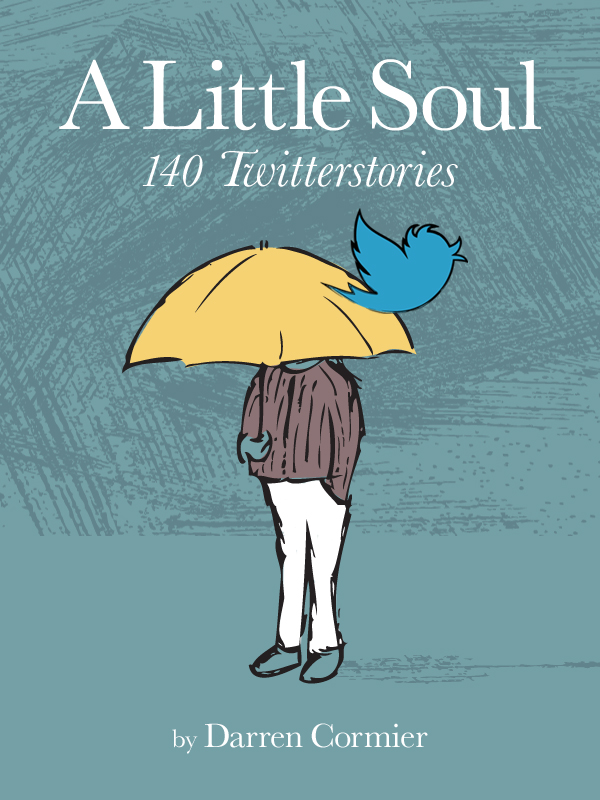Having had a love/hate relationship with the work of the unfortunately late Mr. Wallace I was a little suspicious of this comparison, so I tested another piece: the first section of a short story told in a more traditional narrative form than the novella. (The novella excerpt is admittedly told in a more stream-of-consciousness, run-on sentence style). The result: David Foster Wallace.
"This can't be," I said. "There must be a glitch in the program. Let me try one of my flash fiction pieces." Copied, pasted, analyze button clicked. Result: a David Foster Wallace trifecta!
I tried another. Same result.
I finally received a different result when I attached the first section of yet another short story: William Gibson, and with another piece from my thesis I received JD Salinger. (Apparently I'm in good company, but it took five tries to not get David Foster Wallace. That's like trying to kiss someone four times, and each time they pass you off. The fifth time you try, they're exhausted, half-asleep or drugged up to the point where they think you're David Beckham, so they give you a go. You finally got the kiss you wanted, but only under the strictest circumstances, and only after you were the last person left and they thought you were someone else.)
I resigned myself to this fate. And decided to analyze the decision to see how far off, and to see whether my initial reaction was justified.
My former disdain of Foster Wallace dates back to my early-to-mid twenties. During this period I suffered from a near-fatal malady known as pretentious hipsterism. Symptoms include a disdain for anything popular and loved by the masses, regardless of the artist's former hipster credibility; an obsessive love of anything and everything espoused by Harper's magazine; an embrace of obscure films, music, and books, the more arcane and confounding the better; this aspect naturally adheres to a love of David Lynch, Thomas Pynchon, and John Cage or Einsturzende Neubauten. Those suffering from pretentious hipsterism will maintain their love of these seemingly inscrutable artworks and artists in an effort to maintain status and based on a sense of inflated self-worth and general disdain for everyone else. If they genuinely do not understand it, they will latch on to the artist-in-question for fear of being exposed and being lumped with those he/she is trying to be isolated from. The fact that other people don't understand the work is a sign of their inferiority, despite the hipster's inability to objectively justify and explain their avowed understanding of the work. Common phrases to be heard are, "I totally get what he was trying to do. Well, it's hard to explain. You just have to get it" and "Oh my god! You didn't get it? It's like" followed by an explanation peppered with other obscure references with the hope of baffling the person asking what it meant while never getting around to explaining or even answering what the person who "didn't get it" was asking.
Other symptoms include unkempt appearance, flannel shirts, permanent three to four day stubble on the men, an adoption of affectations in the form of headwear (i.e. fedora, bandana, driver's cap, etc.), and a reticent air of superiority.
Foster Wallace met all of these criteria and more. His work was defined by long run-on sentences, bloated, over-inflated page lengths for stories, an obsessive need for footnotes in most of his work, including fiction, an overindulgence in scientific and mathematical references (an effort to show how much he had read), and a general reputation that the more convoluted and inscrutable a work, the more he would be regarded as a genius. His most heralded work is Infinite Jest, a 1088 page novel about so many topics, the novel has its own reference set and its own cultish reading groups dedicated to it. In his author photos, Wallace wore a bandana over long scraggly hair that hung to his lower neck. He possessed permanent stubble. He also has a cult-like following and his work has routinely been referred to as erudite, inscrutable, confusing, and among the most talented writers if his generation.
After hearing so much about him and the ubiquitous Infinite Jest, I decided to read some of him. I went to the library and took out his short story collection Girl With Curious Hair, and his essay collection A Supposedly Fun Thing I'll Never do Again, an edited version of the title essay having appeared in Harper's. The short stories were okay, some being amazing, including "Everything is Green," one of the greatest examples of how power shifts being two characters in a story, sometimes without one of the characters saying a word. Some were a bit more obtuse and show-offy (e.g., "Westward the Course of Empire Takes Its Way").
The essay collection is where I truly developed my love/hate relationship with him. In the title essay "A Supposedly Fun Thing I'll Never Do Again" Wallace travels aboard a Caribbean cruise and examines what life is like for seven days, what the behind-the-scenes are like, the people, his own reactions to being on the cruise and having to write about it, and his ultimate views on what supposedly being pampered and treated like luxury really is like. The essay is extremely funny, absorbing, and frustrating, just like the majority of his work, riddled with self-conscious irony and an awareness of his growing detachment from the rest of the staff. He stated in an interview (which I am still trying to find the link to) that he regretted his detached and forced ironic depiction of everyone on the cruiser and, had he not been on assignment for Harper's, he may have been able to enjoy himself, but felt he had to put on the detached ironic air for the magazine. Whether he would have voluntarily boarded a cruise liner had he not been reporting is up for debate, but pencil me as skeptical that he would have done so.
However, the essay "David Lynch Keeps His Head" is where I really began to loathe Foster Wallace. Although I always acknowledged his talent, I sometimes referred to him as overrated and a pretentious ass: let me explain. In the essay he details Lynch's Lost Highway almost shot by shot, analyzing the movie to a ridiculous degree, believing the movie is a misunderstood masterpiece. I had recently seen Lost Highway and can safely say that it is, for the most part, the most ridiculous of all Lynch movies; it is routinely, and rightfully so, I believe, referred to as one of Lynch's worst movies, almost universally as panned as his Dune was, and as inscrutable as his Inland Empire. (For the record, I don't consider Inland Empire to be his worst movie, just easily the most baffling film in history; baffling isn't bad, it's exactly what it is: confusing, headache-inducing, and possibly good, but I can't be certain.) To me, for someone to be waxing poetic in masturbatory fashion about the virtues and genius of Lost Highway, was to me like saying a deep-fried Twinkie was good enough to be served at a five-star restaurant; it was like saying Michael Bolton should sing opera; that Nicholas Sparks should not only win a Nobel Prize in literature, but also the Nobel Peace Prize as well. It is, to put it simply, a fucking stupid idea. And Lost Highway is just bad. It was one of the first movies I rented and didn't finish and did not feel bad about not having finished it. I have no intention of returning to Lost Highway either to see if maybe, just maybe my previous viewpoint was wrong. It is also around the time when I began to cure myself of pretentious hipsterism. The movie wasn't misunderstood and genius because I didn't understand it. It was hard to understand because it made no sense.
This began the long slog out of pretentious hipsterism. All those bands and movies and TV shows I used to rail against (mostly soft rock, anything with a popular following, and uplifting movies) I began to give a second chance. I didn't hold peoples' tastes against them; if I thought something was bad, if someone listened to latter-day Stevie Wonder or Michael Bolton or Celine Dion, I didn't hold it against them just because I didn't like it; I didn't consider that person inferior because they thought Olivia Tremor Control was weird if they had even heard of them; because they thought Aphex Twin and Autechre were inscrutable and the name of the latter was deliberately unpronounceable. (I have recently been the victim of my previous mentality, receiving the same condescending correction from someone when I mispronounced the name of Autechre, although I knew who the band was and could discuss their music. How obnoxious hipsterism is, I thought? How I hope I never treated anyone with such sneering superiority?); just because someone liked Phil Collins or read Danielle Steele or thought Tori Spelling was a good actress does not mean they were intellectually inferior to me. It just meant they had different tastes. I began seeing the talent level of bands I didn't like; could see their appeal to others and maintain my own aesthetic tastes. Because ultimately that's what tastes in music, books, and movies comes down to: aesthetics. And aesthetics aren't better or worse: they're just aesthetics.
Having developed this new found acceptance, I decided to give David Foster Wallace, the king of hipster lit, another shot. And I began to like him. Not all of his work: I will probably never read Infinite Jest, but I won't hold it against him, and I won't hold it against anyone who wants to read it: it just doesn't appeal to me. And I began to realize that his essays were quite brilliant. I read some of his essays from Consider the Lobster and began reading some of his interviews. I saw at a bookstore in New York that he had written a book on infinity (Everything and More) which appealed him to me even more: he was omnivorous in his interests.
I recently discussed Wallace with a professor of mine, in discussing this essay/entry I was writing, and in discussing the Facebook test I had taken. She mentioned a few of his essays from Consider the Lobster I had not read. I look forward to reading them now.
In my second semester we had to read the craft book Why I Write edited by Will Blythe and write a brief essay on that book. Twenty-six writers were asked why they wrote including Norman Mailer, Pat Conroy, and David Foster Wallace. The Wallace chapter "The Nature of the Fun" really impressed me. I responded to it immediately and decided to write my essay in the same fashion Wallace did, and while trying to mimic his style in this essay, in discussing why I wrote, I probably had more fun writing than almost any other time. Wallace, stated that, a story in progress was like:
"a kind of hideously damaged infant that follows the writer around, forever crawling after the writer (dragging itself across the floors of restaurants where the writer’s trying to eat, appearing at the foot of the bed first thing in the morning, etc.), hideously defective, hydrocephalic and noseless and flipper-armed and incontinent and retarded and dribbling cerebro-spinal fluid out of its mouth as it mewls and blurbles and cries out to the writer, wanting love, wanting the very thing its hideousness guarantees it’ll get: the writer’s complete attention.”
And he's right. It is like that. I decided to paste the entirety of that essay in this blog, but since this entry has gone on long enough, I will paste it as another entry. Probably tomorrow.
After taking the I Write Like test, I commented on the post, "I'll take that." I meant it.
 RSS Feed
RSS Feed

